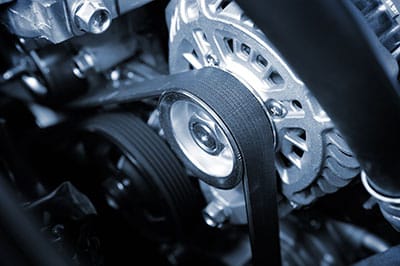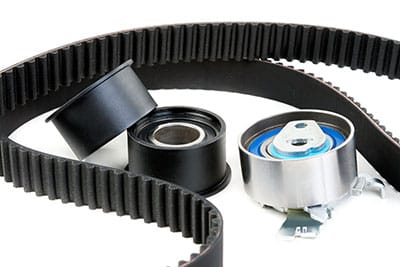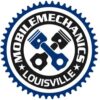Auto Belt Replacement in Louisville, KY

Vehicle engines have different belt configurations depending on the make and model. Whatever the configuration, these belts are crucial to your car’s overall performance. In some cases, your car won’t run without them.
Belts work by transferring the engine’s rotational force to other components, such as the alternator, power steering, water pump, and air conditioning. If one of these belts fails, the connected part stops functioning, too. That’s why our mobile mechanics at Mobile Mechanic Pros Louisville always include inspecting belts during repairs, making sure they’re in good shape before any unexpected breakdowns (expensive repairs) occur.
Signs of Wear in Auto Belts
- Cracking and fraying
- Squealing or chirping noise
- Glazing or shiny appearance
- Loss of power to accessories
- Visible wear on the belt teeth (timing belt)
Kinds of Car Belts
Serpentine Belt
The serpentine belt is the most common in modern vehicles. It’s a long, continuous belt that “snakes” around multiple components, which is where it gets its name. This belt drives several accessories at once, including the alternator, power steering pump, air conditioning compressor, and sometimes the water pump.
The serpentine belt uses the engine’s rotation to power these accessories. Because it handles several systems at once, multiple components will stop working if it fails, which can quickly lead to bigger problems like battery failure or loss of power steering.
Timing Belt
The timing belt is crucial to the engine’s operation. It synchronizes the rotation of the crankshaft and camshaft, ensuring that the engine’s valves open and close at the right times during the engine’s intake and exhaust strokes.
The timing belt keeps the engine’s internal components moving in perfect coordination. If the timing belt fails, the engine can lose synchronization, leading to engine misfires or, in some cases, severe engine damage.
V-Belt
The V-belt, named for its V-shaped cross-section, was commonly used in older vehicles before serpentine belts became more widespread. In some vehicles, especially older models, you may still find multiple V-belts instead of a single serpentine belt. Each V-belt drives a separate component, such as the alternator or power steering pump.
Like the serpentine belt, the V-belt transfers rotational power from the engine to various components. However, each V-belt typically handles only one or two accessories, so if one belt fails, only that specific system will stop working.
Belt Tensioners
Belt tensioners are responsible for maintaining the proper tension on the belts. If a tensioner weakens or sticks, it can cause uneven or excessive wear on the belt. Worse yet, it can lead to premature damage to parts like the water pump and other key accessories.
During a repair, your mechanic will check for any signs of uneven wear and ensure that the tensioner moves smoothly through its range while keeping firm tension. They also see to it that all pulleys are aligned and rotating as they should so everything runs smoothly together.
How Long Do Belts Usually Last?

- Serpentine Belt: Most serpentine belts last between 60,000 to 100,000 miles.
- Timing Belt: Timing belts typically need to be replaced every 60,000 to 100,000 miles, depending on your vehicle’s manufacturer recommendations.
- V-Belt: V-belts, which are found in older vehicles, usually last around 40,000 to 50,000 miles.
There are various factors that can affect the lifespan of a belt, such as driving habits, weather conditions, and overall maintenance of the vehicle. To ensure your belts last as long as possible, it’s a good idea to follow your vehicle’s maintenance schedule and have your mechanic inspect the belts regularly.
Our Belt Replacement Services
During every serpentine or timing belt replacement service, we thoroughly inspect not only the belts but also related components like the tensioners and pulleys, which can affect the longevity and performance of the new belt. This comprehensive approach helps prevent unexpected breakdowns and ensures your vehicle stays reliable on the road.
We pride ourselves on offering convenient, mobile service that comes to you, whether you’re at home or work, so you don’t have to wait hours at a traditional auto repair shop.
Our mechanics use only high-quality replacement belts that match your vehicle’s make and model, ensuring a precise fit and optimal performance. With our fast and efficient service, you can have peace of mind knowing that your vehicle’s belts are replaced by professionals who prioritize safety, reliability, and getting you back on the road as quickly as possible.
Locally owned & trusted automotive repair, We want to be your go-to car repair people
Contact Us Now!
Don’t wait for a breakdown before replacing your car’s belts. Let our mobile mechanics at Mobile Mechanic Pros Louisville take care of your vehicle and ensure its belts are in top shape.
Contact us today to schedule an appointment or inquire about our services!
Next: VW Repair
